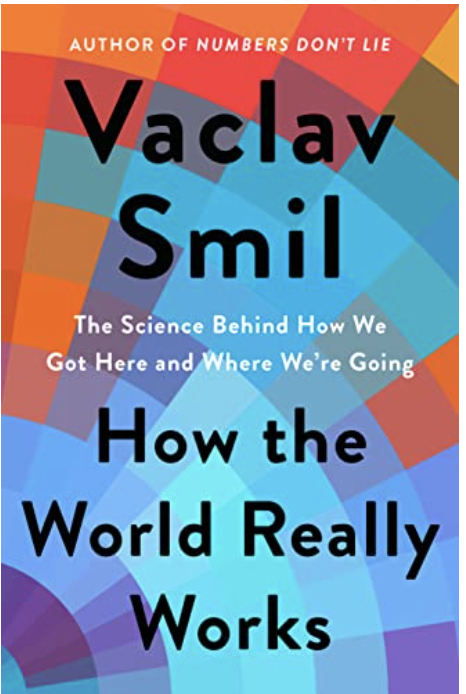I started last night, after perhaps the busiest week of my over 40-year career of typing for a living, a book by Vaclav Smil, a polymath and university professor emeritus. The book is called "How the World Really Works: The Science Behind How We Got Here and Where We're Going."
I'm not sure if "The New York Times has reviewed Smil's book yet, but the fascist newspaper, "The Wall Street Journal" with the world's best book section has. If you can get past their paywall, you can read their dour review here.
"In 1872, a century after the appearance of the last volume of the Encyclopédie, any collection of knowledge had to resort to the superficial treatment of a rapidly expanding range of topics, and, one and a half centuries later, it is impossible to sum up our understanding even within narrowly circumscribed specialties: such terms as “physics” or “biology” are fairly meaningless labels, and experts in particle physics would find it very hard to understand even the first page of a new research paper in viral immunology. Obviously, this atomization of knowledge has not made any public decision-making easier."
When I look at the onslaught of chest-beating self-promoting awards for work that scarcely abrades the skin of the viewing public, I ask myself, "if it didn't really run, if it changed no minds or rang no cash-registers, is it advertising?"
Somehow.
I know it brands me as antediluvian, but some things, and some advertising, is more valid than others. It just is.
And so far, it keeps me off the streets.
So far.
If you can't find the Journal's review, here's the last sentence. If it hits you the way it hit me, you might not sleep for a few nights: "One unsettling conclusion of [Smil's] realistic outlook, might be, in the words of Roman historian Livy, that we can survive neither our vices nor their remedies."
As I do often, I'm getting ahead of myself. I fell into my usual restless sleep after page 20 and my ongoing battles with insomnia yielded me only another 15 or so pages. I am right at the beginning of Smil's book. But I am already struck by what he started with.
"By the middle of the 18th century two French savants, Denis Diderot and Jean le Rond d’Alembert, could still gather a group of knowledgeable contributors to sum up the era’s understanding in fairly exhaustive entries in their multi-volume Encyclopédie, ou Dictionnaire raisonné des sciences, des arts et des métiers....
"In 1872, a century after the appearance of the last volume of the Encyclopédie, any collection of knowledge had to resort to the superficial treatment of a rapidly expanding range of topics, and, one and a half centuries later, it is impossible to sum up our understanding even within narrowly circumscribed specialties: such terms as “physics” or “biology” are fairly meaningless labels, and experts in particle physics would find it very hard to understand even the first page of a new research paper in viral immunology. Obviously, this atomization of knowledge has not made any public decision-making easier."
If you know me, you'd know that the sentence fragment "this atomization of knowledge," got my head spinning. And when my head spins I think often of advertising.
The world--even the world of advertising--has gotten so complex, I think the world of advertising alone can be defined in about 32 thousand different ways.
When I look at the onslaught of chest-beating self-promoting awards for work that scarcely abrades the skin of the viewing public, I ask myself, "if it didn't really run, if it changed no minds or rang no cash-registers, is it advertising?"
Likewise, when I watch Jeopardy! at night, the one show I watch with regularity and see pharma commercial after pharma commercial as plastic as poolside in Beverly Hills, I ask myself, "is something so phony, so devoid of humanity, something that blathers at me for 45 of its 60 seconds about horrible side-effects, advertising?"
When I see people gushing over yet another Toyotathon, or about their cable service or the ineffability of their 5G phone--as inhuman a portrayal of humans I can imagine, I ask, is it advertising?
And when I spend night after night after day after day locked in zoomrooms with CEOs trying to define their companies in eight words or fewer so they can raise millions to launch their companies, I ask, is it advertising?
The answer, I suppose, in all four of those cases and probably 400 more is "yes." It's all advertising.
Somehow.
Yet somehow, it's not.
This is rough and amorphous--wooly writing as my ex-partner Tore Claesson would say. But I worry that when everything is advertising, that nothing is advertising.
And without a core of being real, of reaching real people, giving real information, and influencing real results, we are killing our industry. Those seem like givens. Absolutes. Essential, in the Greek sense of the word.
Our looseness today, in definitions of everything, permits us freedom. The freedom to call Dubble-Bubble and fine French cooking "cuisines." Or tattoos and Caravaggio "art."
And without a core of being real, of reaching real people, giving real information, and influencing real results, we are killing our industry. Those seem like givens. Absolutes. Essential, in the Greek sense of the word.
Our looseness today, in definitions of everything, permits us freedom. The freedom to call Dubble-Bubble and fine French cooking "cuisines." Or tattoos and Caravaggio "art."
I don't buy the equivalency of all cultures or all crafts.
Just as I don't buy all the definitions of advertising above.
I know it brands me as antediluvian, but some things, and some advertising, is more valid than others. It just is.
I will continue to provide non-commoditized help to my growing coterie of CEOs and CMOs.
It's what I do.
It's what I do.
And so far, it keeps me off the streets.
So far.

No comments:
Post a Comment